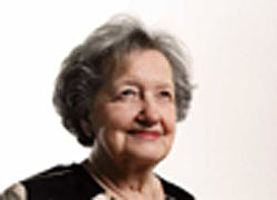2001 Donald O. Hebb Distinguished Contribution Award Winner: Dr. Brenda Milner

Very often, you have heard people in situations like this one say that they are pleased to introduce a particular speaker. Today, I am not only pleased, I feel privileged and honoured because I have been asked by our president, Dr. Lorraine Allan, to introduce to you the winner of this year's BBCS Donald O. Hebb Award, and because this gives me the chance to say a few words about the person who, for many years, has been an academic inspiration: my mentor Dr. Brenda Milner.
Brenda Milner was born in Manchester and grew up in England. When it came time to go to university, unlike most of us, she applied only to the University of Cambridge where she completed her Bachelor's degree in Experimental Psychology. She then came to Canada to teach at the University of Montreal. During this period, she also completed a Master's degree in Experimental Psychology at Cambridge, and shortly thereafter, a Ph.D. in Physiological Psychology at McGill University under the supervision of Dr. Hebb, in whose honour we present this award. How appropriate that she receives this prize!
She set the tone of her career very early on by going against Hebb's advice to study patients of Dr. Wilder Penfield at the Montreal Neurological Institute. There, she decided to build her scientific career studying brain-function relationships, first through behavioural studies in patients who undergo focal removal of cerebral tissue for the treatment of intractable epilepsy, and more recently, through brain imaging studies using positron emission tomography (PET) and functional magnetic resonance imaging (fMRI). Her work has clearly had a major impact in several areas of research in neuroscience. For example, her observations in the patient H.M. did not only enlighten the scientific community with regard to the importance of the medial structures of the temporal lobes in memory, but were also the first, clear, demonstration of the existence of multiple memory systems in the brain. However, her contributions to the field of memory cannot, and must not, be limited to her work with H.M. In fact, her pioneering and meticulous studies of the effects of lesions to the temporal and frontal regions of the brain, has allowed us to understand better the role of these cerebral structures in different forms of memory processes, as well as in other cognitive functions. The results of these investigations have since served as the knowledge base necessary for carrying out neuropsychological evaluations of a variety of patients with neurological disorders. Also, let us not forget about her success in developing, in collaboration with Dr. Rasmussen, the Sodium Amytal test (also called the Wada test), which has made a major difference in the pre-surgical care of patients and the decision making processes of neurosurgeons facing the difficult task of having to remove brain tissue that might be critical for language or memory functions.
Without a doubt, Brenda is appropriately considered as one of the most influential scientists on the Canadian scene, not only in neuroscience, but in science as a whole. For her outstanding contributions to our discipline, she has received numerous honours and prizes. Let me just mention a few that, I believe, she treasures. In 1980, she received her first doctorate honoris causa from Queen's University (in Kingston, Ontario). Since then, she has received 14 other honorary degrees: one from Laval University in 1987, one from the University of Montreal in 1988, one from McGill University in 1991, and a very special one last year from her alma mater, Cambridge. In addition to these distinctions, she has been awarded several prizes including a Career Investigator award from the Medical Research Council of Canada, which has supported her salary for 36 years. She has also been given the Distinguished Scientific Contribution Award of the American Psychological Association and the Izaak Walton Killam Memorial prize (by The Canada Council). She has been named Fellow of the Royal Society of London, Fellow of the Royal Society of Canada, Officer of the Order of Canada, Officier de l'Ordre national du Québec (by René Lévesque), Femme de l'année en sciences au Québec, and Fellow Associate of the National Academy of Science in United States. Finally, in 1997, Canada recognized the importance of her tremendous contributions to science, and her role as a founder of neuropsychology, by electing her to the Canadian Medical Hall of Fame.
Throughout her career, Brenda has played a major role in the politico-scientific arena, by accumulating positions on numerous editorial boards of prestigious journals and committees of several international organizations. Most important to her, however, is the guidance that she has been able to provide to students and post-doctoral fellows that she calls fondly "The Troops." She has inspired many scientists who have forged distinguished careers of their own: Doreen Kimura, Suzanne Corkin, Brian Kolb, Morris Moscovitch and Michael Petrides to name a few.
Now, for those of you who think that she might be considering retirement after having accomplished so much already: this is obviously not an option! She still has research projects funded by the Canadian Institutes of Health Research and is supervising post-doctoral fellows. In all senses of the word, Brenda is really an exceptional woman who lives her life through science. Her commitment to excellence is demonstrated by her rigorous approach to research and writing (how many of you have heard of the Manchester Filter?). I would say that her modus vivendi is to push the quality of work in science to its utmost limits. And, she enjoys the good things in life like a fine bottle of wine, an exquisite meal and a good laugh. In fact, Brenda can recall even minute details about specific meals (like when, where, with whom) that she has had over the years; a subject that may be closely related to the topic of her talk today entitled: "Memory and the right temporal lobe: From patients to imaging." Please join me in welcoming this year's winner of the Donald O. Hebb Award: the inimitable Dr. Brenda Milner.

